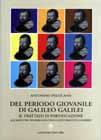European policies urban renewal Communication central places urban form competition information technology open position newsletter urban market infrastructures globalization urban projects news neighborhood ecological networks sprawl anthropology public art public spaces giornata di studi inu large scale plans & projects inu study day planning urban regeneration
Del Periodo Giovanile di Galileo Galilei - Review
by Enrico Musacchio
During his period of teaching at Padua Galileo was concerned also with military architecture. The two writings resulting from this interest of his have not been ignored by scholars of the scientist, even though, overshadowed by more important works, they have provoked no more than superficial attention. It is exactly to these subordinate aspects of Galileo's meditations that Pellicanò turns his attention and undertakes an accurate analysis.
His examination reveals in the first place the most evident features of this surprising sortie of Galileo's in a subject to which his name is not traditionally associated; practical , prestige and career reasons, as the Author clarifies, which compare Galileo's writings with the imposing literature of the Renaissance treatises on the subject. But however praiseworty this close examination of the writings may be, even though marginal, of a thinker of Galileo's importance, the value of Pellicanò's analysis consists much more in his effort to focalize the direction of Galileo's thought in this early period of his intellectual development, even in works which have not had a follow up. The years when Galileo was interested in problems of military architecture are approximately those of the period when Jacopo Mazzoni, whose colleague he was at Pisa, and with whom he kept a long correspondence, elaborates his wide comparison of the philosophical systems of Plato and of Aristotle; and this link is one of the keys Pellicanò makes use of to point out the importance of the novelties in the formulation which emerge in the short military treatise's of Galileo. What is the most important intellectual heritage in Galileo' s thinking, and in that of Aristotle and Plato? According to the thesis supported by Pellicanò, concerning the writings on military architecture, we must keep in mind and give the right evaluation to the importance given by Galileo to the research of the "genius loci", to the determination of the exact features of the place to be defended militarily. This is a need that, compared with platonic essentialism, has a clearly aristotelian flavour, verifiable that can be found in Stagirita's "Metafisica", but which had also been assumed by the scholastic tradition (and in fact S.Thomas in "De Ente et Essentia" observes that "nomen naturae…videtur significare essentiam rei secundum quod habet ordinem ad propriam operationem rei"; it is, therefore inconceivable that a defence system has the same value in abstract and in any possible place; it bases its validity instead in its application to the territorial context for which it is specific: its very essence is ordained to a well defined operation.
From this philosophical direction in the young Galileo's way of thinking, Pellicanò deduces an entirely different way of conceiving the problems of military architecture that make a turning point in the previous Renaissance treatise-writings. But at the end of the sixteenth century the relationship between the Lord and his architects, and also between these architects and the tecnicians who had to carry out the projects, had changed completely. And this is why, as an inevitable consequence, in transmitting the information necessary for the building of engineering plants, and moreover because of the revolution undergone by military art by the perfecting of the artillery, a completely different language had to be used: the more exact and clear language that in reality Galileo (who was always interested in question of expression) refined and mastered.
Pellicanò's analysis of the contents of the two youthful treatises of the Pisan scientist therefore is not only careful, documented and original, but also the starting point of a fascinating exploration of the new paths opening into the world of Science at the beginning of the seventeenth century.
This is a review for:
[Book] Del Periodo Giovanile di Galileo Galilei
by Antonino Pellicanò




Planum
The Journal of Urbanism
ISSN 1723-0993
owned by
Istituto Nazionale di Urbanistica
published by
Planum Association
ISSN 1723-0993 | Registered at Court of Rome 4/12/2001, num. 514/2001
Web site realized by ChannelWeb & Planum Association | Powered by BEdita 3

